
Journal of Lusophone Studies
Scope & Guideline
Celebrating the Vibrancy of Lusophone Literatures
Introduction
Aims and Scopes
- Interdisciplinary Approaches to Lusophone Culture:
The journal encourages research that crosses disciplinary boundaries, integrating perspectives from literature, sociology, history, and cultural studies to explore the nuances of Lusophone identities. - Postcolonial and Decolonial Studies:
A significant focus is placed on postcolonial and decolonial frameworks, examining the legacies of colonialism and the ongoing impacts on Lusophone societies, particularly in Africa and Brazil. - Gender and Feminist Perspectives:
The journal highlights the role of gender in Lusophone literature and culture, showcasing feminist critiques and analyses that address representation and the experiences of women. - Ecocriticism and Environmental Narratives:
Research that intersects literature with ecological themes, examining how Lusophone texts engage with environmental issues, sustainability, and the representation of nature. - Lusophone Diasporic Identities:
The journal explores the experiences and narratives of Lusophone communities across the globe, focusing on themes of migration, identity, and cultural exchange. - Literary Analysis and Criticism:
Scholarly articles often provide deep literary analyses of Lusophone texts, exploring narrative techniques, themes, and the evolution of literary forms.
Trending and Emerging
- Ecocriticism and Environmental Literature:
Recent publications have increasingly focused on ecocritical perspectives, examining how Lusophone literature addresses environmental concerns, climate change, and ecological narratives. - Indigenous and Afro-Brazilian Perspectives:
There is a growing trend towards highlighting Indigenous voices and Afro-Brazilian narratives, exploring themes of identity, resistance, and cultural heritage within Lusophone contexts. - Intersections of Technology and Literature:
Emerging themes around technology, including discussions of cyberculture and speculative fiction, are becoming more prominent, reflecting contemporary societal changes and their representation in literature. - Globalization and Transnationalism:
The journal is increasingly publishing works that analyze the impacts of globalization on Lusophone identities and cultures, addressing how transnational movements shape literary expressions. - Critical Gender Studies:
A notable increase in research exploring LGBTQ+ themes and gender fluidity within Lusophone literature indicates a shift towards more inclusive and diverse representations.
Declining or Waning
- Traditional Historical Narratives:
There has been a noticeable decline in publications focused solely on traditional historical narratives, as scholars increasingly favor interdisciplinary approaches that integrate history with contemporary cultural studies. - Static Representations of National Identity:
Themes surrounding rigid national identities are waning, with a shift towards more fluid and dynamic concepts of identity that acknowledge the complexities of globalization and transnationalism. - Purely Linguistic Studies:
Research centered exclusively on linguistic aspects of the Portuguese language is becoming less frequent, as the journal moves towards a broader exploration of cultural and literary contexts. - Colonial Literature Without Critical Frameworks:
The analysis of colonial literature without incorporating critical perspectives on race, gender, and postcolonial theory is decreasing, as the journal prioritizes critical engagements with these texts. - Conventional Literary Canon:
There is a diminishing focus on the traditional literary canon of Lusophone literature, as newer voices and alternative literatures gain attention, reflecting a broader understanding of what constitutes Lusophone culture.
Similar Journals
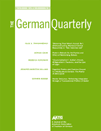
GERMAN QUARTERLY
Illuminating the Rich Tapestry of German HeritageGERMAN QUARTERLY, published by Wiley, is a distinguished academic journal that serves as a vital platform for scholarly discourse in the fields of Cultural Studies, Literature and Literary Theory, and Visual Arts and Performing Arts. With an ISSN of 0016-8831 and an E-ISSN of 1756-1183, this journal is committed to exploring the complexities of German literature and culture from a multi-faceted perspective. It stands out in its categories, ranking Q3 in Cultural Studies and Q2 in both Literature and Literary Theory and Visual Arts and Performing Arts, as of 2023. Its Scopus ranking highlights its relevance and contribution to ongoing dialogues within the arts and humanities, making it an essential read for researchers and professionals alike. Although not an open-access journal, GERMAN QUARTERLY maintains a rigorous peer-review process, ensuring that published works meet the highest standards of academic quality. With converged contributions from 2002 to 2024, it continues to provide valuable insights and foster a deeper understanding of German heritage and its impact on contemporary culture. The journal is an indispensable resource for students and researchers seeking to broaden their knowledge and engage with the latest scholarship in these vital areas of study.

MESTER
Fostering Critical Thought in Literature and LanguageMESTER is a distinguished academic journal published by the UCLA College of Humanities, known for its commitment to advancing research in the fields of Cultural Studies, Linguistics and Language, and Literature and Literary Theory. With an ISSN of 0160-2764, this journal serves as a vital platform for scholars and professionals to disseminate innovative research and critical perspectives from diverse theoretical frameworks and cultural contexts. Although currently operating without an Open Access model, MESTER continues to uphold a rigorous peer-review process, ensuring that published articles maintain high academic standards. Recognized for its selective focus, MESTER holds a Q4 categorization in Cultural Studies and Linguistics, and Q3 in Literature and Literary Theory, situating it as a relevant, if emerging, voice within these disciplines. Housed within the significant repository of knowledge at UCLA, the journal beckons researchers, students, and practitioners to engage with its contributions to the humanities and build upon its foundations in cultural discourse.

Expressions maghrebines
Advancing Critical Discourse in Francophone NarrativesExpressions maghrebines, an esteemed journal published by Florida State University, fosters scholarly dialogue in the realm of Literature and Literary Theory, focusing on the vibrant narratives and critical discourses emerging from the Maghreb region. Established in 2002, this journal has become a vital resource for researchers, professionals, and students, illustrating a commitment to exploring contemporary trends in Francophone literature. With an impressive Q3 rank in 2023, it stands within the top echelon of its category, offering insightful analyses and innovative perspectives to enhance academic understanding. Though not an open-access publication, Expressions maghrebines is indispensable for those seeking to delve into the cultural and intellectual currents that shape Maghreb literary landscapes, thus reinforcing its position as a significant contributor to the academic community's exploration of Francophone studies.
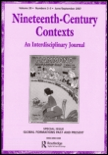
Nineteenth-Century Contexts-An Interdisciplinary Journal
Unraveling Cultural Narratives Through Interdisciplinary LensesNineteenth-Century Contexts: An Interdisciplinary Journal is a pivotal academic publication that serves as a vital resource for scholars and students engaged in the exploration of the complex cultural, literary, and social dimensions of the nineteenth century. Published by Routledge Journals, Taylor & Francis Ltd, this journal holds a position within the Q2 and Q3 quartiles in the fields of Literature and Literary Theory and Cultural Studies respectively, illustrating its significance and relevance in contemporary research. Since its inception in 1987, it has fostered interdisciplinary dialogue and examination of the era's rich contexts, featuring articles that weave together historical, literary, and cultural analyses. Although the journal does not currently offer an open access model, its rigorous peer-review process guarantees scholarly integrity and quality. Housed in the United Kingdom, it caters to a global audience, thereby attracting diverse perspectives and insights, making it an essential publication for anyone looking to deepen their understanding of the complexities of the nineteenth century.
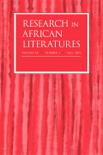
RESEARCH IN AFRICAN LITERATURES
Exploring the Depths of African NarrativesRESEARCH IN AFRICAN LITERATURES is a prestigious peer-reviewed journal published by Indiana University Press, dedicated to the critical exploration of African literary traditions, cultures, and texts. With an ISSN of 0034-5210 and an E-ISSN of 1527-2044, this journal stands out in the field of literature and literary theory, currently ranking in the 80th percentile of its category according to Scopus, making it a significant platform for scholars and researchers alike. Since its establishment, the journal has evolved through converged volumes from 2002 to 2024, consistently fostering innovative discourse and interdisciplinary approaches that illuminate the complexities of African narratives. Although it does not offer open access, the journal is integral for anyone engaged in African studies, providing critical insights that are essential for understanding the broader implications of literature within diverse cultural contexts. The journal's commitment to high standards of scholarship is reflected in its Q3 quartile ranking and its influential contribution to contemporary literary dialogue.
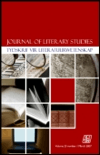
Journal of Literary Studies
Championing accessibility in literary scholarship.Journal of Literary Studies, published by UNISA PRESS, is a premier open access journal dedicated to advancing the field of literature and literary theory. With its ISSN 0256-4718 and E-ISSN 1753-5387, the journal has established itself as a leading platform for innovative research since its inception in 1985, with a notable convergence period running through to 2024. Recognized in the Q1 quartile of literature and literary theory, the journal ranks impressively at #236 out of 1106 in its category according to Scopus, highlighting its impact in the arts and humanities with a percentile rank of 78th. The journal's open access model, adopted in 2022, reflects its commitment to accessibility and dissemination of knowledge globally, making it an essential resource for researchers, academics, and students alike. With an editorial focus on interdisciplinary approaches and contemporary critical discourse, the Journal of Literary Studies serves as a vital vessel for the exchange of ideas and scholarly dialogue in the intricate landscape of literary studies.
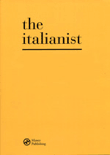
Italianist
Connecting Scholars Through the Lens of Italian StudiesItalianist is a distinguished peer-reviewed journal published by Routledge Journals, Taylor & Francis Ltd, focusing on the multifaceted aspects of Italian culture, history, and anthropology. With a proud history spanning from 1981 to 2001 and then again from 2003 to 2024, this journal caters to a global audience of scholars, professionals, and students seeking to deepen their understanding of Italian studies. Although it currently operates without an open access option, it provides invaluable insights that contribute to critical discourse in the field, evidenced by its rankings in Scopus: Q4 in Anthropology and Q3 in History, demonstrating its growing influence among academics. The journal is based in the United Kingdom and strives to promote high-quality research that explores historical narratives, cultural practices, and anthropological themes related to Italy, making it an essential resource for anyone interested in this rich and vibrant area of study.

FRENCH REVIEW
Cultivating Knowledge Across French Linguistics and LiteratureFRENCH REVIEW, published by Johns Hopkins University Press, is a premier journal in the fields of Cultural Studies, Education, Linguistics and Language, and Literature and Literary Theory. With its ISSN 0016-111X and E-ISSN 2329-7131, this journal serves as a vital resource for scholars and practitioners seeking to engage with contemporary topics through rigorous academic discourse. The journal has made notable strides in its impact factor, ranking in the third quartile for Cultural Studies and Linguistics, as well as the second quartile for Literature. While it currently does not offer open access, FRENCH REVIEW remains committed to fostering critical analysis and interdisciplinary approaches, effectively contributing to the advancement of research and understanding in its respective fields. With its converged years spanning from 2002 to 2024, this journal is an essential platform for exchanging ideas and enhancing knowledge in the vibrant landscape of French studies and beyond.

Chung Wai Literary Quarterly
Illuminating the Rich Tapestry of Chinese LiteratureChung Wai Literary Quarterly is a distinguished academic journal published by NATL TAIWAN UNIV PRESS, dedicated to advancing the study of literature and cultural discourse in the Chinese-speaking world. With its ISSN 0303-0849, this quarterly publication serves as a vital platform for scholars, students, and literary enthusiasts interested in exploring contemporary and classical literary themes through a critical lens. Although it does not currently offer open access options, the journal is well-regarded for its rigorous selection process and commitment to scholarly excellence. The editorial team curates a diverse range of articles that encompass literary critique, theoretical explorations, and interdisciplinary dialogues, contributing significantly to the academic conversation in this field. As it continues to bridge the gap between scholarly inquiry and practical engagement with literature, Chung Wai Literary Quarterly remains an essential resource for anyone seeking to deepen their understanding of literary studies and its broader implications.

Abriu-Estudos de Textualidade do Brasil Galicia e Portugal
Advancing Knowledge in Textual Studies Across BordersAbriu-Estudos de Textualidade do Brasil Galicia e Portugal, published by UNIV BARCELONA, FACULTAD FILOLOGIA, is a pivotal open-access journal dedicated to the expansive study of textuality across Brazil, Galicia, and Portugal. Since its inception in 2012, this journal has become an essential resource for researchers, scholars, and students interested in the interconnections among literature, linguistics, history, and the arts. With a commitment to fostering academic discourse, Abriu presents a diverse range of articles that examine the richness of cultural and linguistic expressions within the Iberian Peninsula and beyond. With-category quartile rankings of Q3 in History and Q4 in Linguistics and Language, the journal reflects its growing influence in the respective fields, while Scopus rankings underscore its commitment to high-quality scholarship. By providing open-access options, Abriu ensures that valuable knowledge remains accessible to all, furthering its objective to bridge cultures and disciplines in contemporary discussions. The journal’s scope spans critical analyses and innovative approaches in textual studies, making it a vital platform for advancing research and discourse.